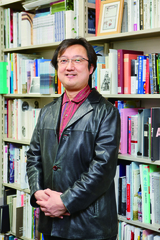European Studies Course
The oldest, and the newest ―― that is Europe



Where is the world headed? Europe is a good model.
European Studies Course : Minoru SHIMIZU, Professor
Europe is a continent of plurality, comprising many nations, cultures and languages. Moreover, its expansive modern development came about in the context of close linkages with North and South America, Africa and Asia.
This program cultivates understanding of Europe from a global perspective, by combining detailed study of national histories, cultures and societies using languages such as English, German, French and Russian, with examination of the relations between Europe and the rest of the world. Neither a general survey of Europe as a whole, nor a deep study of one or more individual nations would be sufficient, for it is vital to comprehend questions concerning Europe in terms of the interplay of cooperation and antagonism, and within the framework of themes common to all areas of the word,such as religion, migration and colonialism. To reach a globally-informed understanding of Germany, for example, must involve learning about not only the history, contemporary society, and language of Germany, but also the recurring pattern of conflict and reconciliation with neighboring France; nations such as Turkey, Italy, and Spain whose immigrants have filled out the workforce; and regions as far as the Americas, China and Japan, where war or colonization gave rise to population movements or cultural and technical exchanges.
Student’s Voice
European Studies Course Second-year Student : Adzhar ATIKAH BINTI
European Studies Course Third-year Student : Tetsuko TAKETANI

Studying in Kyoto, a place I love, with my good friends
I’m from Malaysia, and after spending my first two years in Japan attending to a Japanese language school, I was attracted to this program by the chance to study from a global viewpoint. The lecture contents have met my expectations, and Tetsuko, my good friend from my advanced English class, has been helping me with difficult Japanese expressions. In the future, I hope to work in Asian business development for a Japanese company.
Overseas training is required, and I’m planning to study in Australia for the second time
I chose this faculty because I am interested in foreign cultures and in the future, I want to find a job where I can use English. The subjects I have learned about so far, in addition to lectures on relations between EU nations / Islamic countries and Japan, and colonialism, I have learned about the French literature and German painting. Last year I spent a short time studying in Australia, and this year I will return for a full year of study, polishing my English and my international sensibility. Atika is my good friend.
|
European Studies Course Asia-Pacific Studies Course Americas Studies Course |